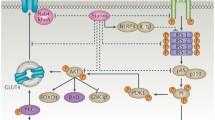Abstract
Several large-scale clinical trials have assessed the efficacy of atorvastatin in the primary and secondary prevention of cardiovascular events in patients with diabetes mellitus and/or metabolic syndrome. In primary prevention, CARDS (Collaborative Atorvastatin Diabetes Study) showed that atorvastatin 10 mg/day (vs placebo) reduced relative risk of the composite primary endpoint (acute coronary heart disease [CHD] events, coronary revascularisation, or stroke) by 37% (p = 0.001). This decrease was similar to decreases in major cardiovascular events in the ASCOT-LLA (Anglo-Scandinavian Cardiac Outcomes Trial-Lipid Lowering Arm) trial and HPS (Heart Protection Study). However, in CARDS, atorvastatin efficacy was evident as early as 6 months after starting treatment, whereas in HPS, simvastatin efficacy was noticeable only from about 15–18 months after starting treatment. In the ASCOT-LLA trial, in 2226 hypertensive diabetic patients without previous cardiovascular disease, atorvastatin (vs placebo) reduced the relative risk of all cardiovascular events and procedures by 25% (p = 0.038).
In secondary prevention, substudies of the GREACE (GREek Atorvastatin and Coronary-heart-disease Evaluation), TNT (Treating to New Targets) and PROVE-IT (PRavastatin Or atorVastatin Evaluation and Infection Therapy) trials reported results for the approximately 15–25% of study participants who had diabetes. In the GREACE substudy, atorvastatin (vs physicians’ standard care) significantly reduced the relative risk of total mortality by 52% (p = 0.049), coronary mortality by 62% (p = 0.042), coronary morbidity by 59% (p < 0.002) and stroke by 68% (p = 0.046). In the TNT substudy, incidence of the primary endpoint was significantly lower in diabetic patients treated with atorvastatin 80 mg/day rather than 10 mg/day (13.8% vs 17.9%; relative risk 0.75; p = 0.026). In the PROVE-IT substudy, a significantly lower incidence of acute cardiac events was reported for atorvastatin versus pravastatin recipients (21.1% vs 26.6%; p = 0.03) and, therefore, an absolute risk reduction of 5.5% was associated with atorvastatin therapy.
ASPEN (Atorvastatin Study for Prevention of coronary heart disease Endpoints in Non-insulin-dependent diabetes mellitus) — a mixed primary and secondary prevention trial in diabetic patients — found that a 29% lower low-density lipoprotein-cholesterol level was seen with atorvastatin than placebo at endpoint (p < 0.0001); however, the reduction in composite primary endpoint of major cardiovascular events (cardiovascular mortality, nonfatal major cardiovascular event or stroke, and unstable angina requiring hospitalisation) with atorvastatin (13.7% vs 15.0% with placebo), and reduction in acute myocardial infarction relative risk of 27% with atorvastatin were not statistically significant.
In CHD patients with metabolic syndrome (n = 5584) in a sub-analysis of the TNT trial, intensive versus lower-dosage atorvastatin therapy reduced the relative risk of major cardiovascular and cerebrovascular events by 29% (p < 0.0001). The analysis also revealed that CHD patients with, rather than those without, metabolic syndrome had a 44% greater level of absolute cardiovascular risk, thus clearly underscoring the clinical feasibility of administering intensive lipid-lowering therapy to CHD patients with metabolic syndrome.
In summary, several patient populations, from definitive, large-scale studies, are now available to corroborate the integral place of atorvastatin — in line with various regional and internationally accepted disease management guidelines — in the primary and secondary prevention of cardiovascular events in patients with diabetes and/or metabolic syndrome.







Similar content being viewed by others
Notes
The use of trade names is for product identification purposes only and does not imply endorsement.
References
American Diabetes Association. Standards of medical care in diabetes. Diabetes Care 2005; 28 Suppl. 1: 4–36
Grundy SM, Cleeman JI, Merz CNB, et al. Implications of recent clinical trials for the National Cholesterol Education Program Adult Treatment Panel III Guidelines. Circulation 2004; 110: 227–39
Colhoun HM, Betteridge DJ, Durrington PN, et al. Primary prevention of cardiovascular disease with atorvastatin in type 2 diabetes in the Collaborative Atorvastatin Diabetes Study (CARDS): multicentre randomised placebo-controlled trial. Lancet 2004; 364: 685–96
Shepherd J, Barter P, Carmena R, et al. Effect of lowering LDL cholesterol substantially below currently recommended levels in patients with coronary heart disease and diabetes. The Treating to New Targets (TNT) study. Diabetes Care 2006; 29: 1220–6
Ahmed S, Cannon CP, Murphy SA, et al. Acute coronary syndromes and diabetes: is intensive lipid lowering beneficial? Results of the PROVE iT-TIMI22 trial. Eur Heart J 2006; 27: 2323–9
Deedwania P, Barter P, Carmena R, et al. Reduction of low-density lipoprotein cholesterol in patients with coronary heart disease and metabolic syndrome: analysis of the Treating to New Targets study. Lancet 2006; 368: 919–28
Athyros VG, Papageorgiou AA, Symeonidis AN, et al. Early benefit from structured care with atorvastatin in patients with coronary heart disease and diabetes mellitus. Angiology 2003; 54: 679–90
Knopp RH, d’Emden M, Smilde JG, et al. Efficacy and safety of atorvastatin in the prevention of cardiovascular end points in subjects with type 2 diabetes: the Atorvastatin Study for Prevention of Coronary Heart Disease Endpoints in Non-Insulin-Dependent Diabetes Mellitus (ASPEN). Diabetes Care 2006; 29: 1478–85
Sever PS, Poulter NR, Dahlöf B, et al. Reduction in cardiovascular events with atorvastatin in 2,532 patients with type 2 diabetes. Anglo-Scandinavian Cardiac Outcomes Trial, Lipid-Lowering Arm (ASCOT-LLA). Diabetes Care 2005; 28: 1151–7
Athyros VG, Papageorgiou AA, Mercouris BR, et al. Treatment with atorvastatin to the National Cholesterol Educational Program goal versus ‘usual’ care in secondary coronary heart disease prevention. The GREek Atorvastatin and Coronary-heart-disease Evaluation (GREACE) study. Curr Med Res Opin 2002; 18: 215–9
LaRosa JC, Grundy SM, Waters DD, et al. Intensive lipid lowering with atorvastatin in patients with stable coronary disease. N Engl J Med 2005; 352: 1425–35
Beckman JA, Creager MA, Libby P. Diabetes and atherosclerosis: epidemiology, pathophysiology, and management. JAMA 2002; 287: 2570–81
Expert Panel on Detection, Evaluation, and Treatment of High Blood Cholesterol in Adults. Executive summary of the third report of the National Cholesterol Education Program (NCEP) Expert Panel on Detection, Evaluation, and Treatment of High Blood Cholesterol in Adults (Adult Treatment Panel III). JAMA 2001; 285: 2486–97
Grundy SM, Cleeman JI, Daniels SR, et al. Diagnosis and management of the metabolic syndrome: an American Heart Association/National Heart, Lung, and Blood Institute Scientific Statement [executive summary]. Cardiol Rev 2005; 13: 322–7
Collins R, Armitage J, Parish S, et al. MRC/BHF Heart Protection Study of cholesterol-lowering with simvastatin in 5963 people with diabetes: a randomised placebo-controlled trial. Lancet 2003; 361: 2005–16
Colhoun HM, Betteridge DJ, Durrington PN, et al. Rapid emergence of effect of atorvastatin on cardiovascular outcomes in the Collaborative Atorvastatin Diabetes Study (CARDS). Diabetologia 2005; 48: 2482–5
Ray KK, Cannon CP. Atorvastatin and cardiovascular protection: a review and comparison of recent clinical trials. Expert Opin Pharmacother 2005; 6: 915–27
ALLHAT Officers and Coordinators for the ALLHAT Collaborative Research Group. Major outcomes in moderately hypercholesterolemic, hypertensive patients randomized to pravastatin vs usual care: the Antihypertensive and Lipid-Lowering Treatment to Prevent Heart Attack Trial (ALLHAT-LLT). JAMA 2002; 288: 2998–3007
Goldberg RB, Mellies MJ, Sacks FM, et al. Cardiovascular events and their reduction with pravastatin in diabetic and glucose-intolerant myocardial infarction survivors with average cholesterol levels: subgroup analyses in the cholesterol and recurrent events (CARE) trial. The Care Investigators. Circulation 1998; 98: 2513–9
Keech A, Colquhoun D, Best J, et al. Secondary prevention of cardiovascular events with long-term pravastatin in patients with diabetes or impaired fasting glucose: results from the LIPID trial. Diabetes Care 2003; 26: 2713–21
Kastelein JJ. The future of best practice: atherosclerosis. 1999; 143 Suppl. 1: S17–21
Pyorälä K, Pedersen TR, Kjekshus J, et al. Cholesterol lowering with simvastatin improves prognosis of diabetic patients with coronary heart disease: a subgroup analysis of the Scandinavian Simvastatin Survival Study (4S). Diabetes Care 1997; 20: 614–20
Cannon CP, Braunwald E, McCabe CH, et al. Intensive versus moderate lipid lowering with statins after acute coronary syndromes. N Engl J Med 2004; 350: 1495–504
Nissen SE, Tuzcu EM, Schoenhagen P, et al. Effect of intensive compared with moderate lipid-lowering therapy on progression of coronary atherosclerosis: a randomized controlled trial. JAMA 2004; 291: 1071–80
de Lemos JA, Blazing MA, Wiviott SD, et al. Early intensive vs a delayed conservative simvastatin strategy in patients with acute coronary syndromes: phase Z of the A to Z trial. JAMA 2004; 292: 1307–16
Baigent C, Keech A, Kearney PM, et al. Efficacy and safety of cholesterol-lowering treatment: prospective meta-analysis of data from 90,056 participants in 14 randomised trials of statins. Lancet 2005; 366: 1267–78
Acknowledgements
The preparation of this manuscript has been sponsored by Pfizer Italia, who proposed the initial idea of the review. Prof. Marcello Arca has the responsibility of reported data as well as of their interpretation. The sponsor had no role in the approval of the manuscript. Prof. Marcello Arca served as a consultant and/or received speaker honoraria from Merck Sharp & Dhome, Astra Zeneca, Simesa, Sanofi Aventis, Pfizer, Guidotti and Neopharmed. The author wishes to thank Dr Michelangelo Barone from the Medical Department of Pfizer Italia for his technical support in collecting part of the material used for this paper. Editorial support for the preparation of the manuscript was provided by Wolters Kluwer Health Medical Communications.
Author information
Authors and Affiliations
Corresponding author
Rights and permissions
About this article
Cite this article
Area, M. Atorvastatin Efficacy in the Prevention of Cardiovascular Events in Patients with Diabetes Mellitus and/or Metabolic Syndrome. Drugs 67 (Suppl 1), 43–54 (2007). https://doi.org/10.2165/00003495-200767001-00005
Published:
Issue Date:
DOI: https://doi.org/10.2165/00003495-200767001-00005




